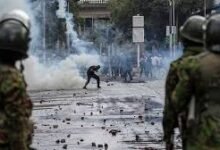Sudan army rejects civilian dominance

A top official in Sudan’s military council has told the BBC it will not allow civilians a majority on the supreme council set to rule the country during a transitional period.
Lt Gen Salah Abdelkhalek said that the most they would accept would be an equal split with civilians.
Protesters are continuing their mass sit-in outside military headquarters (HQ) to demand that the army cede control.
President Omar al-Bashir was ousted from power on April 11 after 30 years.
He was replaced by a transitional military council that promised to relinquish power to civilians within two years – a proposal rejected by protesters.
Protest leaders accuse the military of not negotiating in good faith and promoting the interests of Mr Bashir.
The military leaders say that they need to be in charge to ensure order and security in the country.
The seven-member transitional military council led by Lt-Gen Abdel Fattah Abdelrahman Burhan is currently in charge.
Both it and the protesters have agreed that the next government will be made up of technocrats, not well-known politicians or the military, says the BBC’s James Copnall in Khartoum.
But there would also be a supreme council, which would be above the government. Its composition and exact powers are still a subject of negotiation.
This supreme council replaces the president, and ensures that the military can retain relevance and power, while the civilians run the actual government business, our reporter says.
Lt Gen Abdelkhalek told the BBC’s Newsday programme that the military would insist on having at least half of all seats on the new supreme council: “[It’s] a red line, maybe half and half,” he said.
Opposition leaders – under The Declaration of Freedom and Change Forces (DFCF) umbrella – sent a draft constitutional document on Thursday to the military council, outlining their proposals for the transition period before elections are held.
The draft, seen by news agency Reuters, also proposes the responsibilities of a cabinet and a 120-member legislature.
The DFCF says it is waiting for the military council to respond.
The African Union revised its 15-day ultimatum set on April 15 for the military leaders to hand over power to civilians. They now have 60 days or face suspension from the continental body. –BBC





